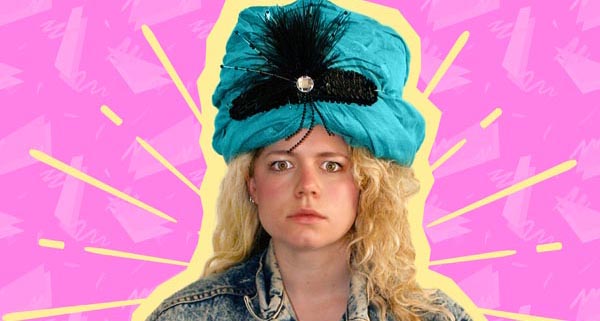For concept and willingness to experiment alone, Louise Reay demands a huge heap of Fringe respect. As last year, she is doing a whole comedy show in Chinese, her confident assertion being that since communication is only 7% verbal anyway, it shouldn’t matter.
It does matter, of course. For chunks of the show, the audience, including those members called to the stage, are baffled, but it mainly all happens, to use the film cliché, “with hilarious consequences”.
As the show begins, Louise is looking for love and keeps finding auguries of it all over the place. She has premonitions of her dream man when she’s sleeping, and a Zoltar fortune-telling machine (like the one in Big) keeps churning out images of potential suitors, who, if you squint a bit, might be like some of the chaps in the audience. It’s a prompt to get them on stage for some mild flirtation and prop tomfoolery, which depending how sharp the would-be romeo is can be hilarious or frustrating.
The overwhelming impression watching this is how difficult Reay has made it for herself. Anyone who has worked as a teacher, particularly a foreign language teacher, knows the feeling of being met with a sea of blank faces. As an audience member, you feel yourself being that blank face, to your favourite teacher, in the “fun” lesson at the end of term. That combination of frustration, sympathy, amusement, shamefacedness and bewilderment is an unusual one.
The language barrier means Reay has to employ everything else at her disposal to convey meaning. So props are used, dozens of them, just to keep the thing moving. That’s not to mention the video projector, and the life-size Zoltar machine which seems painstakingly re-constructed. It looks exhausting.
Sometimes no matter how hard she tries, it just doesn’t work. One particularly slow-on-the-uptake guest doesn’t realise he is dressed as a seal, and completely misunderstands what he is to do with the props Reay is firing in his direction. The audience have got it and start shouting out, but Reay has nothing but gesture to make this happen. Unlike, say, physical comedians The Kagools in the room next door, whose silence and amplified gestures can always do the trick, the fact that Reay is also speaking sets up an expectation that there is more to understand, and this causes confusion. When it does work, and the audience member plays ball, as happens in a passage where she dresses one up as her baby, it’s as funny as any English language comedy, with the added smug multi-culturally enlightened pat-on-the-back you can give yourself for appreciating something in a foreign language.
The show closes with a reveal about Louise’s love search. It doesn’t explain all of what’s just happened, but enough to reward staying with it. Certainly, Reay is doing little wrong within the constraints she’s put on herself, but a gig in Chinese seems fated to feel experimental. In that spirit, it is very enjoyable.
